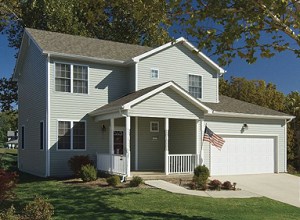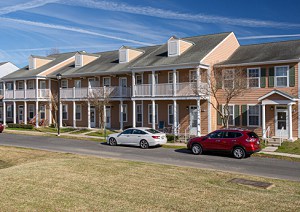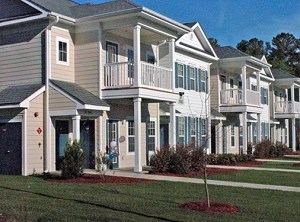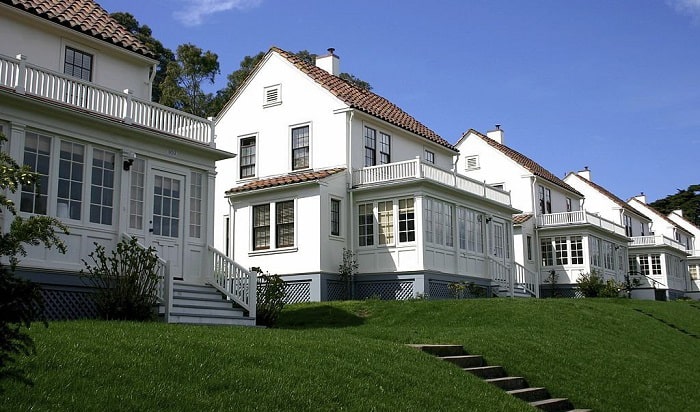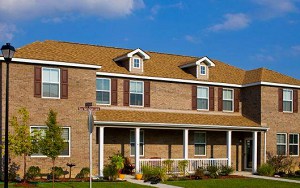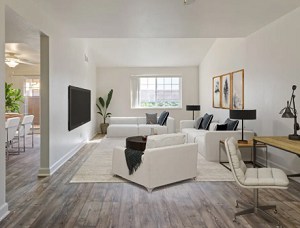How does military housing work? Military members usually do not need to worry about housing.
There are plenty of options, including living on base in barracks or family housing, or off base with basic housing allowance (BAH). The luxury of choosing comes with higher ranks.
But housing can also be affected by factors like location and family situation. So, to learn all about homes for military members, continue reading. We will give you all the details in this article.
Table of Contents
Who Lives Where?
If You Are Married or Have Dependents
If you are married and reside with your spouse or minor dependents, you will live in housing on base or receive a military housing allowance to live off-base.
The allowance is called BAH, short for Basic Allowance for Housing.
The amount of BAH you are entitled to depends on your rank, duty station zip code, and whether or not you have dependents.
If You Are In The Guard or Reserves
If you are receiving a housing allowance and are in the Guard or Reserves, your BAH will be BAH Type II, which is a reduced type for anytime you are on active duty for less than 30 days. By this token, when you are called to serve on active for 30 days or more, you will be entitled to the full BAH rate.
If You Have Dependents & Are In Barracks
As a member with dependents, you will still get a housing allowance if you live in the barracks during basic training or technical school. This is so that you can provide adequate housing for your dependents. The amount that you receive depends on where your dependents are living.
If You Are Not Married or Divorced, Are Paying Child Support & Are In Barracks
In this case, you will get the BAH-DIFF rather than the full rate BAH. You can learn more about this rate here.
If You Are Single
You can live on base in barracks or move out to housing off-base, but the latter depends on the occupancy rate of the barracks on your base. If you move out of housing units on base and are single, you will not be entitled to housing allowance.
On-Base Housing
1. Barracks
All military members live in the barracks during basic training.
Afterward, whether a member is required to live there depends on his or her ranks.
- The Army and the Marine Corps will have single service members with E-5 and below pay grades live in the barracks.
- The Navy will have single service members with E-4 and below pay grades to live in the barracks.
- The Air Force will have single service members with under 3 years of service and E-4 or below pay grades to live in the barracks.
The insides of barracks are not the same nationwide. But, typically, they are similar to college dorms. For this reason, though, they are sometimes also referred to as military dorms.
As with any other type of housing, there are good ones and less preferable ones.
They vary depending on many factors, such as:
- The size of the base and the on-base population
- The member’s duty station
- The member’s unit assignment
Some members have roommates, while some do not.
In general, though, barracks have bathrooms, kitchens, bedrooms, and living rooms.
Most are also equipped with a walk-in closet, desk, rolling chair, and nightstand.
Members are free to add furniture, rearrange, and decorate.
But, since moving is frequent, most tend to live minimally and leave rooms as they were.
- You are closer to work
- You get better security
- You do not have to worry about paying for utilities
- You might have to share a room with someone else
- You will have to keep your room clean for weekly room check-ups
Characteristics of the Barracks / Dorms by Branch
1. The Army
After basic training and technical school, soldiers are entitled to a standard two bedroom apartment. The soldiers share a bathroom, kitchen, and living room, but they each get a private bedroom.
Here is an example of an Army on base housing unit from Fort Leonard Wood:
2. The Air Force
After basic training and technical school, all airmen get to live in private barrack rooms. They are rooms remodeled from old barracks to be one plus one. These rooms feature a kitchen and a private room, while the bathroom and shower are shared.
There is also an upgraded program called “Dorms 4 Airmen,” where Air Force dorms are essentially four bedroom apartments. There is a private room and private bath, and the four roommates share a kitchen, living room, washer, and dryer.
3. The Navy
The Navy is a bit different from the Army and Air Force. Rather than constructing barracks for all sailors, which is very costly, the Navy turned to the private industry to build and operate privatized housing for single, low-ranking sailors.
But like the Army, the housing is a two bedroom apartment where each sailor gets a private bedroom, and the bathroom, kitchen, and living room are shared.
Under this program, sailors must pay a complex management rent every month, which is equal to their housing allowance. The rent includes their utilities, rental insurance, and other amenities like the fitness facility, media center, and technology center.
Here is an example of a Navy base housing:
4. The Marine Corps
Junior Marines from E1 to E3 pay grades must share a room and bathroom, while those of E4 and E5 pay grades are entitled to a private room. Marines are subjected to two types of inspections: announced and unannounced, where the Commander or First Sergeant inspects the rooms for cleanliness or search for contraband, like knives, guns, drugs, etc.
2. Family Housing
Military members can live in family housing on base if they reside with a dependent, such as a spouse or child.
Usually, the utilities (electric, gas, water, trash, etc) are free.
Furniture is not provided, but you can “loan” some, like closets and sofas.
Some appliances are provided. For example, refrigerators, stoves, and dishwashers. Washers and dryers are not often provided because there is a laundromat or laundry room on base.
The number of bedrooms you get depends on the number and age of the dependents who are living with you. Most units are duplexes or fourplexes. Officers and senior enlisted members tend to get duplexes or single dwellings.
The condition of family housing units varies. If you are lucky, you will get a brand new or renovated unit. But some historic ones can appear beaten up.
In densely populated areas, the units will be smaller and more compact, while those in sparsely populated are larger and more spacious.
Here are some examples of Army base housing for married couples:
- You will be closer to work
- You will not have to pay for electric, gas, water, or trash pick-ups
- You will be provided with some essential appliances, such as fridges, stoves, and dishwashers
- You will have to comply with strict maintenance standards about the outside of the house and yard
- There will be personnel who patrol weekly and write tickets for discrepancies
- If you get to may tickets in a short period, you will be asked to move off base
- You need to return the house to its original state if you make improvements and the next person who moves in do not accept them
- The checking out or moving out process is extremely demanding and time-consuming. You must be prepared o have the inside of the house cleaned and inspected
Off-Base Housing
1. Eligibility by Branch
The Army
You can live off base at government expense if you are single and in the E6 pay grade or above. Some bases will allow you to do this at E5 pay grade if the occupancy rate of the base exceeds 95 percent.
The Air Force
If your pay grade is E4 or above and you have more than 3 years of service, you are allowed to move off base and live in housing at government expense.
The Navy
You can live off base if you are a single sailor with a pay grade of E5 or above, or you have served for more than 4 years and your pay grade is E4.
The Marine Corps
Single Marines with E6 pay grade and above can live off base at government expense. But some bases will also allow single E5s and E4s if the occupancy rate exceeds 95 percent.
To give you an idea of what military housing looks like off-base:
Take a look inside military housing of this unit for rent in San Diego:
- You might be able to save money. If you find a place with lower rent or mortgage payments than your BAH, you can put the extra in your piggy bank. If this is what you are interested in, look for more information on military housing rental programs.
- You get more options to choose from. There is a wider selection of houses for you to consider off base. You can make decisions based on a particular style or desired amenity.
- You can get things that are not available in base housing. For instance, you might have additional bedrooms, a larger garage, a fireplace, a swimming pool,… as long as they are within your BAH.
- You are free to make it your own. Unlike the strict uniformity rules for housing on base, you can personalize your home with any DIY projects you want. Even those including paint!
- You can have more pets. Some base housing does not allow pets, and some only welcome up to two pets per household. But when you live off base, you can have as many pets as you want.
- You might have to commute longer. Since you are not on base, you must travel a certain distance to work each day. Even if the distance isn’t large, you might still have to deal with traffic jams.
- You might feel disconnected from the base community. You might feel lonely and excluded since you are not as close with others living on base.
- You might have to spend more on facilities. You might have to drive and pay more to shop at the local grocery store, gym, or school, while these are generally available and accessible on base. So, in this regard living in a military base can be more convenient and less costly.
Conclusion
Now, you how the details of how does military housing work. Hopefully, this has been interesting as well as informative. To recap, military personnel can live in housing on base and off base. There are pros and cons for both. If you have any other insights to add, please leave a comment below. Also, share this article with others so they can find out how military housing works.

I am Everett Bledsoe, taking on the responsibility of content producer for The Soldiers Project. My purpose in this project is to give honest reviews on the gear utilized and tested over time. Of course, you cannot go wrong when checking out our package of information and guide, too, as they come from reliable sources and years of experience.



